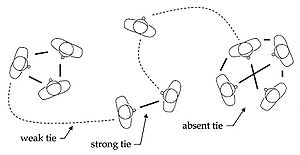- Peace on Facebook
"Facebook is proud to play a part in promoting peace by building technology that helps people better understand each other. By enabling people from diverse backgrounds to easily connect and share their ideas, we can decrease world conflict in the short and long term." - Connected: The Surprising Power of Our Social Networks
Book I need to read
Yearly Archives: 2009
Links for 2009 11 12
- Commons Based Peer Production – GitHub
In commons-based peer production there should be a mechanism to mitigate the potential impacts of malicious users. Slashdot has its moderation system, Wikipedia its editors, and git has `blame`. In fact this functionality is a crucial part of what enables the ‘virtue spreading virtue’ element of such peer production.
Links for 2009 11 10
Links for 2009 11 08
- 2,000-Year-Old Scrolls, Internet-Era Crime – The New York Times
For a while, no one knew that 50 different names in the Dead Sea Scrolls debate were the prolific Mr. Golb, a graduate of Oberlin College who has a law degree from New York University and a doctorate in comparative literature from Harvard (dissertation: “The Problems of Privacy and Trust in Modern Literature, and their Relation to the Idea of Freedom”).
Links for 2009 11 02
Links for 2009 10 27
- Google Social Search Help
The following people make up your social circle:* People you’re connected to through social services that you’ve listed in your Google profile, such as Twitter and FriendFeed.
* People in your Gmail (or Google Talk) chat list.
* People in your Friends, Family, and Coworkers contact groups for Google.If someone you don’t know shows up in your social search results, it’s likely that they’re connected to someone you do know. Social Search includes results from public connections of your immediate social circle, since there’s a high likelihood that you know them as well. For example, if you’re following someone on Twitter, and that person is following five other people, those five other people are also included in your social circle.
- Official Google Blog: Introducing Google Social Search
Google Social Search helps you find more relevant public content from your broader social circle.
Trust research and Nobel prize
 Elinor Ostrom got the Nobel prize for Economics!
Elinor Ostrom got the Nobel prize for Economics!
I think I read some of her insights about trust and reciprocity! Check her book “Trust and reciprocity: interdisciplinary lessons from experimental research”!
She is also the first woman to win the Nobel prize in Economics!
From her wikipedia page:
Ostrom is considered one of the leading scholars in the study of common pool resources. In particular, Ostrom’s work emphasizes how humans and ecosystems interact to provide for long run sustainable resource yields. Forests, fisheries, oil fields, grazing lands, and irrigation systems, among others, all exhibit the characteristics of common pool resources and Ostrom’s work has highlighted how humans have created diverse institutional arrangements over natural resources for thousands of years that have prevented ecosystem collapse. Yet, Ostrom is quick to point out that, while successes are abundant, humans are also responsible for countless ecosystem collapses. Her current work emphasizes the multifaceted nature of human-ecosystem interaction and argues against any singular “panacea” attempt to solve individual social-ecological system problems.
Paper by Lada Adamic “Surfing a web of trust: reputation and reciprocity on CouchSurfing.com”

- Image via Wikipedia
By Debra Lauterbach; Hung Truong; Tanuj Shah; Lada A. Adamic
Download as PDF
Abstract: Reputation mechanisms are essential for online transactions, where the parties have little prior experience with one another. This is especially true when transactions result in offline interactions. There are few situations requiring more trust than letting a stranger sleep in your home, or conversely, staying on someone else’s couch. Couchsurfing.com allows individuals to do just this. The global CouchSurfing network displays a high degree of reciprocal interaction and a large strongly connected component of individuals surfing the globe. This high degree of interaction and reciprocity among participants is enabled by a reputation system that allows individuals to vouch for one another. We find that the strength of a friendship tie is most predictive of whether an individual will vouch for another. However, vouches based on weak ties outnumber those between close friends. We discuss these and other factors that could inform a more robust reputation system.
Notes: Can an online social network build enough trust to allow strangers to sleep on each others’ couches?
“The Web as random acts of kindness”, Zittrain talk at TED
His point: The Internet is made up of millions of disinterested acts of kindness, curiosity and trust. Summarized in this passage: “So it’s kinda like your house catches on fire. The bad news is there is no fire brigade. The good news is random people operate from nowhere, put out the fire and leave without expecting payment or prize.”
Brilliant examples of collaboration, ranging from “how the internet was created” to Wikipedia (and its presence in chinese restaurant menus), from a site to collect Cats that look like Hitler to Couchsurfing.
Links for 2009 10 07
- Twitter CEO on the Future of Twitter (yes, they are making a reputation system!)
The network is also working on a reputation system, based on ratings from other users. "We are working on reputation systems … You may not know someone is trustworthy, but other people who are trustworthy trust them."

![Reblog this post [with Zemanta]](https://i2.wp.com/img.zemanta.com/reblog_e.png?w=625)